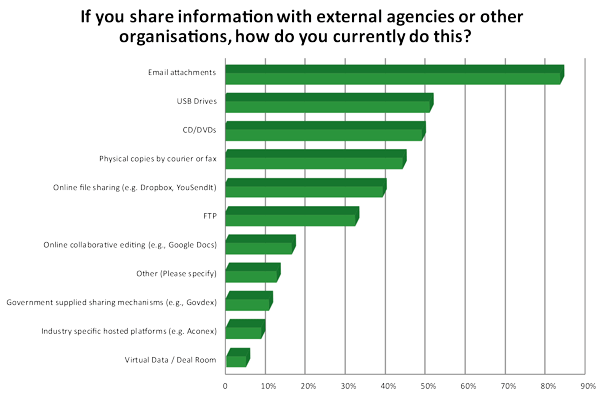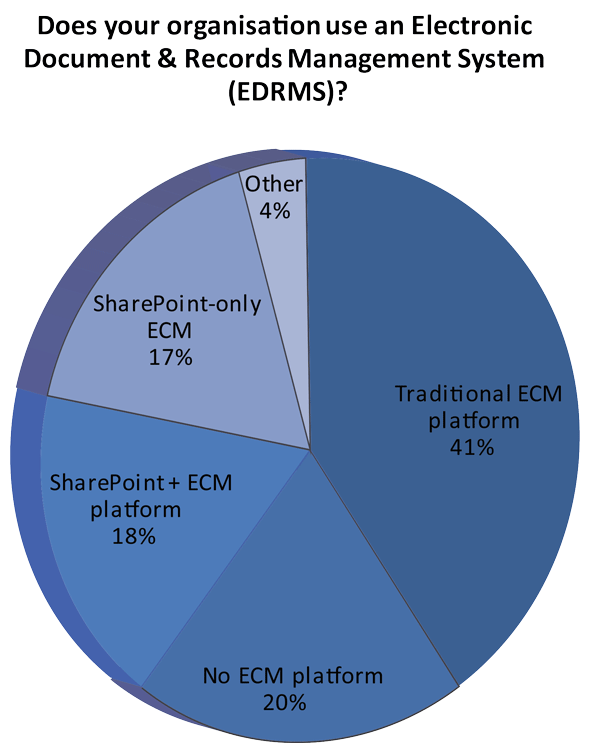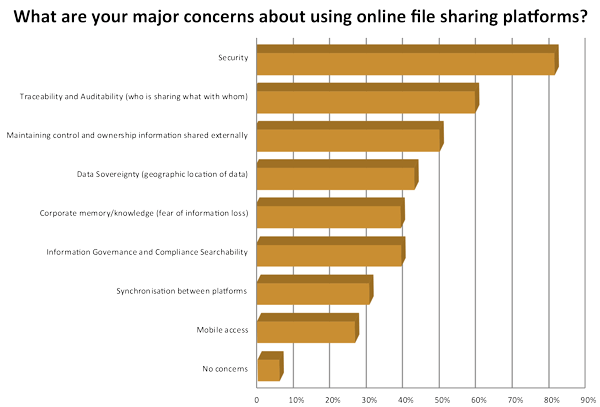Divided road for corporate file-sharing
There is a split emerging in the world of information management, between those who allow Web-based filesharing and those who don’t.
A survey into filesharing at enterprise and government organisations in Australia and New Zealand conducted by IDM and Australia’s Institute for Information Management (IIM) came up with an almost even split between those who restrict the use of popular filesharing apps such as DropBox and YouSendIt and those who turn a blind eye.
More than 130 responded to the survey, with responses coming from a range of Australian and New Zealand government and enterprise users. The sample included IT Managers, CIOs, Records and Knowledge Managers, business analysts and consultants.

Cloud-based file-sharing and synchronisation (FSS) tools are among the hottest applications used in the workplace, offered by market-leader Dropbox and a large and growing number of vendors.
These tools, which broadly can be classified as “consumer-focused” because they are typically deployed by individual users and not as part of a coordinated IT plan, offer tremendous usability.
However, non-enterprise FSS tools can create a number of problems, including lack of IT oversight for corporate content, an inability to find and produce data on demand, malware infiltration and other problems.
Concerns over cloud-based file-sharing among those who participated in our survey centred on security, closely followed by the challenge of maintaining control and ownership of information shared externally and data sovereignty (see chart below).
One of those surveyed was concerned if “synchronisation between platforms" doesn't mean integration with software (such as an EDRMS &/or ECM)."
Pronouncements on the death of email would appear to be somewhat premature, as more than 85% of those who responded still send content via email attachments. This is still the primary method for most to share information with outside organisations, although many organisations are applying quota limitations to sending and receiving in order to impose some discipline.
Traditional use of physical media, in the form of USB drives and CD/DVDs, remains in the top three despite all the well-publicised examples of embarrassing data leaks.

The Department of Health and Ageing Canberra restricts use of filesharing apps due to concerns over security and bandwidth limitations
Director Paul Storey said, “We have set up password protected sub domains for the sharing of data among specific groups.
“We regard our web site as a communications hub; file sharing is just one aspect of this. Our aim is to integrate communications activities using the web as a platform.
“This approach includes file sharing, document updating with tracking, comments and conversations including voice and video, real time access to help agents through chat, conversation rooms etc. etc.
“In this context file sharing is just a natural component of our communications mix, so we may look at putting background information together with a wiki document in an environment that includes a chat facility, part of this may also be available as embedded content to allow other websites to carry the conversation string and background but not the wiki for example. We choose not to narrow our focus but rather look for opportunities to integrate.”
Privacy and confidentiality are leading concerns at Queensland’s Building Services Authority (BSA), which must facilitate information sharing with legal representatives, engineers and its inspectors.
Content is delivered as email attachments or via traditional methods of sending physical copies by courier or fax.
Records Manager Chris Larsen said, “As a Government agency it is paramount that the public has confidence in how their ...extremely private information is handled and who actually has access to it. As in some cases the organisation has records relating to how a company/individual conducts their business.
“In saying this we do have some business partners that have extremely limited access to their own information, this though is extremely controlled.
“My main concern would be getting all the information that they collect in relation to whatever we are working on, what they believe is not a record could very well be a significant record in our eyes and be the lynchpin in future actions taken.”
A specialist filesharing solution from Accellion has been adopted by Chemtura, a SharePoint user and one of the largest specialty chemical companies in the United States.
Australian System Support Engineer at Chemtura Sav Sfyrios said the solution is being well received by users who were previously on the Dropbox & YouSendIt.
“They have told us that this is just as easy to use,” he said.
The deployment of Accellion has changed the way staff interact with outside organisations, for instance in the case of a software program it has built internally for water testing,
“We are able to send updates of this software through to the users who use an Internet connection, all others we send out the CD with the update/patch on it,” said Sfyrios.
“External customers are aware as this software sends email to advise them they have been added to the system and are available to download from it.”

Most staff at one of Australia major universities ignore official restrictions on online sharing, according to one academic who completed our survey.
“If you read through all the organisational policies, you'd probably conclude that use the use of online filesharing such as Dropbox was not appropriate due to concerns about privacy of living people, confidentiality promised in partnership agreements, being subject to the US Patriot Act, ensuring longevity of data required for various compliance reasons etc.
“However in practice the use of online filesharing is widespread in the organisation (as it makes collaboration and mobile working more convenient in an everyday way) and little is done to discourage it, a situation which will probably persist until such time as some significant problem arises as a result of the use of file sharing in either our own or a similar organisation.
“I would be more concerned at allowing the worst-case risks of online file sharing to outweigh the everyday benefits (more effective collaboration and support for mobile working) without regard to the specifics of the data sharing under discussion. One rule does not fit all situations! We should educate our people about the risks/benefits and then trust them (wherever possible) to behave sensibly in relation to their choice of technologies for file sharing.”
According to one State Government manager “Generally there is a lag time between legislative requirements regarding information management and what the IT industry can deliver and also a gap between what a government organisation needs legally within the law and the business approaches of the IT industries.”
Lewis Atkinson, Knowledge & Program Evaluation Manager at Meat & Livestock Australia (MLA) would like to restrict filesharing because of the perceived "insecurity" of the data which may be open to malicious hacking.
“But in reality we just ignore it. Employees have to share files and the only way we facilitate that is via email which has size limitations so they "unofficially" use on-line file shares as a workaround to get their job done. This is problem for politically sensitive material and other material that we do not own copyright [for] “
While the MLA is underway with a global deployment of Share Point 2010 to provide extranet capabilities, staff are presently making use of Web-based tools.
Objective is launching in 2012 its own cloud platform for government inter-agency collaboration, Objective Connect.
Objective CEO Tony Walls commented, “"Organisations want to share information securely while individuals want to share easily, and these results are further evidence of that.
“The release of Objective Connect removes this emerging split by integrating secure sharing with ease of use. It can link directly to your ECM as it encrypts the shared content, aligns to Defence Signals Directorate security regimes while providing auditability and traceability. Now organisations are able to share information with confidence and control—making our vision of connected government a reality.”
(Many thanks to those who contributed to the IDM/IIM filesharing survey, which received over 120 submissions from across Australia and New Zealand.
There can be only one winner, and on this occasion it ws Devitt Larkin, Documentation Manager, MSG Legal at Macquarie Bank who has won the $500 Visa Gift Card.)
